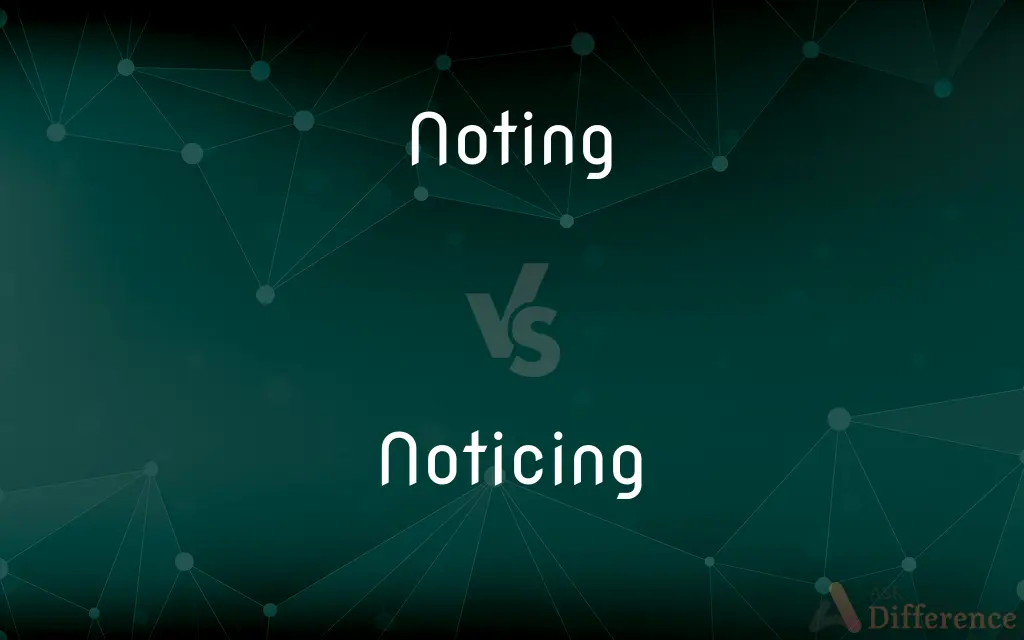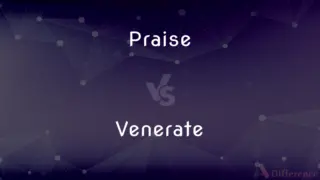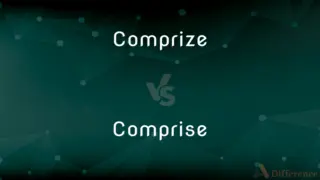Noting vs. Noticing — What's the Difference?
By Maham Liaqat & Fiza Rafique — Updated on April 23, 2024
Noting involves the act of recording or mentioning something briefly, whereas noticing refers to the awareness or observation of something.

Difference Between Noting and Noticing
Table of Contents
ADVERTISEMENT
Key Differences
Noting is typically a deliberate action where information is recorded in written form to ensure it is remembered or addressed later, such as jotting down key points during a meeting. Whereas noticing involves the cognitive process of becoming aware of something through the senses, like detecting a strange smell in a room.
When someone is noting something, they are often engaging in an activity that involves summarizing or capturing the essence of information, often for future reference. On the other hand, noticing is more about an immediate recognition or realization, which might not necessarily lead to any action.
Noting can be seen in academic and professional settings where precise information needs to be documented for records or further analysis. Whereas noticing is a more general and spontaneous activity that can occur in any setting, such as noticing someone's mood change during a conversation.
The tools used for noting usually include pen and paper or digital devices, emphasizing the importance of accuracy and retrievability. In contrast, noticing does not require any tools, as it relies solely on human perception and mental processing.
In the context of communication, noting is essential for effectively transmitting detailed information over time, ensuring nothing is overlooked. Whereas noticing plays a crucial role in interpersonal interactions, where understanding non-verbal cues or changes in the environment can impact the communication dynamic.
ADVERTISEMENT
Comparison Chart
Definition
The act of recording information briefly.
The act of becoming aware of something.
Purpose
To remember or address information later.
To recognize or realize something.
Usage Setting
Often in academic and professional environments.
Can occur in any setting.
Tools Required
Pen and paper, digital devices.
No tools required, relies on perception.
Role in Communication
Important for detailed information transmission.
Crucial for understanding non-verbal cues.
Compare with Definitions
Noting
Writing down or marking information to remember.
He was noting down the important points from the lecture.
Noticing
Acknowledging someone or something's presence.
She liked noticing the small details in paintings.
Noting
Making a formal record of something.
The committee was noting objections for the official record.
Noticing
Realizing something previously overlooked.
After reviewing the data, they started noticing patterns.
Noting
Acknowledging or recognizing in context.
Noting the changes, he adjusted his strategy accordingly.
Noticing
Observing or detecting with the senses.
She started noticing a strange noise in the engine.
Noting
Mentioning something specifically.
She made a point of noting everyone's contributions.
Noticing
Becoming aware of something by chance.
Walking in the park, he couldn't help noticing the variety of birds.
Noting
Using a system or method to catalog information.
She was noting her observations in a research journal.
Noticing
Paying special attention to something.
He began noticing how often she avoided the topic.
Noting
A brief record, especially one written down to aid the memory
Took notes on the lecture.
Noticing
The act of noting or observing; perception or attention
That detail escaped my notice.
Noting
A comment or explanation, as on a passage in a text
The allusion is explained in the notes at the end of the chapter.
Noticing
Respectful attention or consideration
Grateful for the teacher's notice.
Noting
A brief informal letter
Sent a note to the child's teacher.
Noticing
A written or printed announcement
A notice of sale.
Noting
A formal written diplomatic or official communication.
Noticing
A formal announcement, notification, or warning, especially an announcement of one's intention to withdraw from an agreement or leave a job
Gave my employer two weeks' notice.
Raised the price without notice.
Noting
A piece of paper currency.
Noticing
The condition of being formally warned or notified
Put us on notice for chronic lateness.
Noting
A debt security, usually with a maturity of ten years or less.
Noticing
A printed critical review, as of a play or book.
Noting
A promissory note.
Noticing
To take notice of; observe
Noticed a figure in the doorway. ].
Noting
A tone of definite pitch.
Noticing
The act by which something is noticed.
Noting
A symbol for such a tone, indicating pitch by its position on the staff and duration by its shape.
Noting
A key of an instrument, such as a piano.
Noting
The characteristic vocal sound made by a songbird or other animal
The clear note of a cardinal.
Noting
The sign of a particular quality or emotion
A note of despair in his remarks.
A note of gaiety in her manner.
Noting
A distinctive component of a complex flavor or aroma
A full-bodied wine with notes of cherry and musk.
Noting
Importance; consequence
Nothing of note happened.
Noting
Notice; observation
Quietly took note of the scene.
Noting
(Obsolete) A song, melody, or tune.
Noting
To observe carefully; notice
Note the difference between these two plants. ].
Noting
Present participle of note
Noting
A note; a written remark.
Noting
Pronunciation spelling of nothing
To a man of honour a kick is noting, a blow is noting, de soul is de abode of glory, honour, pride.
Common Curiosities
Can noting be done digitally?
Yes, noting can be done using digital devices like tablets and smartphones.
How does noticing differ from observing?
Noticing is spontaneously becoming aware, whereas observing is more deliberate and sustained.
Does noticing require any special skills?
Noticing requires perceptual awareness but not necessarily specialized skills.
Is noticing always conscious?
Noticing can be both conscious and subconscious, depending on the context.
What tools are essential for noting?
Tools such as pens, papers, or digital devices are essential for noting.
What makes noting reliable in information tracking?
The systematic approach to noting makes it reliable for tracking information.
Is noticing affected by distractions?
Yes, distractions can significantly affect one's ability to notice.
What is the primary focus of noting?
Noting focuses on recording information for future reference.
How can one improve their noticing skills?
Improving noticing skills can be achieved through mindfulness and enhanced observational practices.
In what scenarios is noting most valuable?
Noting is valuable in scenarios where information needs to be referred back to, such as in meetings or research.
Share Your Discovery

Previous Comparison
Praise vs. Venerate
Next Comparison
Comprize vs. CompriseAuthor Spotlight
Written by
Maham LiaqatCo-written by
Fiza RafiqueFiza Rafique is a skilled content writer at AskDifference.com, where she meticulously refines and enhances written pieces. Drawing from her vast editorial expertise, Fiza ensures clarity, accuracy, and precision in every article. Passionate about language, she continually seeks to elevate the quality of content for readers worldwide.
















































